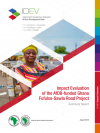Transport forms a key focus area in the core operational priorities of the African Development Bank’s Ten-Year Strategy (2013–2022). The road sub-sector makes up the bulk of the Bank’s transport sector investments, funding the construction of national roads and major international corridors. Independent Development Evaluation (IDEV) at the AfDB conducted an impact evaluation of the Fufulso-Sawla Road Project (FSRP) in Ghana. The project aimed to enhance accessibility along the Fufulso-Sawla Road and improve livelihoods in the project area of influence. The project stands out as a flagship in terms of its inclusive and integrated design, which provides a holistic response to the socio-economic needs of the beneficiary districts by not only constructing a 147.5km road but also ancillary works including a hospital, health centers, education facilities, a water treatment plant and market centers, for a total sum of USD 156 million.
The objectives of this impact evaluation were: (i) to estimate the impacts of AfDB-supported integrated infrastructure projects on key intermediate and long-term outcomes; (ii) to identify explanatory factors that affect the development outcomes of the project; and (iii) to generate lessons and provide recommendations for improving the impacts of integrated infrastructure interventions.
Overall, the evaluation found positive impact of the FSRP on improved transportation conditions in beneficiary communities, on household incomes, health and education outcomes, and poverty reduction; and the intervention benefited women and girls specifically, albeit to a lesser degree than men. However, these positive development outcomes were highly unlikely to be sustained, due to deficiencies in design, capacity, maintenance, and community engagement and ownership.
The evaluation generated the following key lessons:
- Integrating community development interventions into road transport infrastructure brings an added value to, and fast tracks, the Bank’s poverty reduction, job creation, and inclusive development efforts.
- Participation and collaboration among stakeholders are key to the sustainability of integrated road interventions similar to the FSRP, as they can amplify or jeopardize a project’s impact.
- Coupling road projects with community development interventions can increase the likelihood of benefits accruing to women and girls.
The evaluation made the following recommendations to the Bank:
- Enhance the Bank’s integrated approach to its road investments to foster development impact in terms of poverty reduction.
- Improve the quality of road projects’ design and results focus.
- Strengthen the human and institutional capacity to sustain development gains.
Task Managers: Joseph Mounda, Chief Evaluation Officer & Eric Kere, Senior Evaluation Officer


